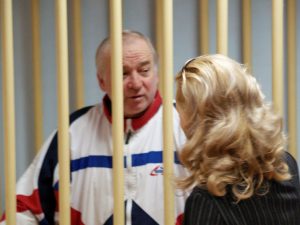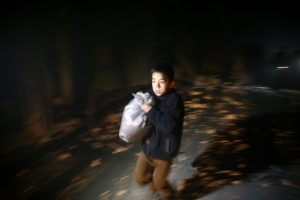
By Olzhas Auyezov and Guy Faulconbridge
ASTANA/LONDON (Reuters) – Russia is set to expel British diplomats in retaliation for Prime Minister Theresa May’s decision to kick out 23 Russians as relations with London crashed to a post-Cold War low over an attack with military-grade nerve agent on English soil.
After the first known offensive use of such a weapon in Europe since World War Two, May blamed Moscow and gave 23 Russians who she said were spies working under diplomatic cover at the London embassy a week to leave.
Russia has denied any involvement, cast Britain as a post-colonial power unsettled by Brexit, and even suggested London fabricated the attack in an attempt to whip up anti-Russian hysteria.
Asked by a Reuters reporter in the Kazakh capital if Russia planned to expel British diplomats from Moscow, Russian Foreign Minister Sergei Lavrov smiled and said: “We will, of course.”
Kremlin spokesman Dmitry Peskov said Russia could announce its response at any minute.
Britain, the United States, Germany and France jointly called on Russia on Thursday to explain the attack. U.S. President Donald Trump said it looked as though the Russians were behind it.
A German government spokesman called the attack “an immense, appalling event”. Chancellor Angela Merkel said an EU summit next week would discuss the issue, in the first instance to seek clarity, and that any boycott of the soccer World Cup, which Russia is hosting in June and July, was not an immediate priority.
INDEPENDENT VERIFICATION
Russia has refused Britain’s demands to explain how Novichok, a nerve agent developed by the Soviet military, was used to strike down Sergei Skripal, 66, and his daughter Yulia, 33, in the southern English city of Salisbury.
Britain has written to the Organisation for the Prohibition of Chemical Weapons in The Hague, which monitors compliance with the global convention outlawing the use of such weapons, to obtain independent verification of the substance used.
Skripal, a former colonel in the GRU who betrayed dozens of Russian agents to British intelligence, and his daughter have been critically ill since March 4, when they were found unconscious on a bench.
A British policeman was also poisoned when he went to help them is, and is in a serious but stable condition.
British investigators are working on the theory that an item of clothing or cosmetics or a gift in the luggage of Skripal’s daughter was impregnated with the toxin, and then opened in Skripal’s house in Salisbury, the Daily Telegraph said.
President Vladimir Putin, a former KGB spy who is poised to win a fourth term in an election on Sunday, has so far only said publicly that Britain should get to the bottom of what has happened.
In a sign of just how tense the relationship has become, British and Russian ministers used openly insulting language while the Russian ambassador said London was trying to divert attention from the difficulties it was having managing Britain’s exit from the European Union.
“SHOCKING AND UNFORGIVABLE”
British Foreign Secretary Boris Johnson said Britain had no quarrel with the Russian people but that it was overwhelmingly likely that Putin himself took the decision to deploy the nerve toxin in England.
“We have nothing against the Russians themselves. There is to be no Russophobia as a result of what is happening,” he said.
“Our quarrel is with Putin’s Kremlin, and with his decision – and we think it overwhelmingly likely that it was his decision – to direct the use of a nerve agent on the streets of the UK.”
The Kremlin’s Peskov called the allegation that Putin was involved “a shocking and unforgivable breach of the diplomatic rules of decent behavior”, TASS news agency reported.
British Defence Secretary Gavin Williamson sparked particular outrage in Moscow with his blunt comment on Thursday that “Russia should go away, it should shut up.”
Russia’s Defence Ministry said he was an “intellectual impotent” and Lavrov said he probably lacked education. Williamson studied social science at the University of Bradford.
“Well he’s a nice man, I’m told, maybe he wants to claim a place in history by making some bold statements,” Lavrov said. “Maybe he lacks education, I don’t know.”
In London, opposition Labour Party leader Jeremy Corbyn struck a starkly different tone to that of the British government by warning against rushing into a new Cold War before full evidence of Moscow’s culpability was proven.
Corbyn said Labour did not support Putin and that Russia should be held to account if it was behind the attack.
“That does not mean we should resign ourselves to a ‘new cold war’ of escalating arms spending, proxy conflicts across the globe and a McCarthyite intolerance of dissent,” he said.
(Additional reporting by William James, David Milliken and Kate Holton in London, and Maria Tsvetkova, Jack Stubbs and Andrew Osborn in Moscow; Writing by Guy Faulconbridge; Editing by Kevin Liffey)











